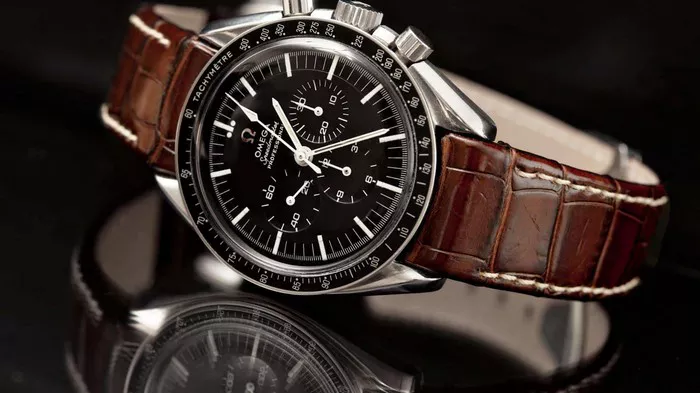Omega watches are renowned for their precision and durability, but like any high-quality timepiece, they can experience issues that cause them to stop functioning properly. If your Omega watch keeps stopping, it can be a source of frustration. This comprehensive guide will explore the various reasons why this might be happening and offer solutions to help you resolve the issue.
Battery Issues
Battery Depletion
One of the most common reasons for a watch to stop is a dead or depleted battery. Omega watches, particularly quartz models, rely on batteries to keep time accurately. If the battery is low or has died, the watch will cease to function.
Solution: Replace the battery with a new one. It’s advisable to have this done by a professional watchmaker or an authorized Omega service center to ensure that the replacement battery is of high quality and properly installed.
Battery Contact Problems
Sometimes, the issue might not be with the battery itself but with the contacts that connect the battery to the watch’s circuitry. Corrosion or loose contacts can interrupt the power supply.
Solution: Have a professional inspect the battery contacts. They can clean or repair any issues to ensure proper connectivity.
Mechanical Issues
Movement Problems
For mechanical Omega watches, stopping could be a sign of issues with the movement. Mechanical movements are intricate and involve numerous tiny components that can wear out or become misaligned.
Solution: A thorough servicing of the movement might be required. This typically involves disassembling the watch, cleaning the parts, lubricating the movement, and reassembling it.
Power Reserve Depletion
Mechanical watches, especially manual ones, require regular winding to maintain their power reserve. If not wound frequently, the watch will stop running.
Solution: Ensure that you wind the watch regularly. If the watch is automatic, wearing it consistently will keep it running, or you can use a watch winder to maintain the power reserve.
Magnetism
Exposure to Magnetic Fields
Omega watches, particularly those with mechanical movements, can be affected by strong magnetic fields. Exposure to magnets (e.g., speakers, fridge magnets) can cause the watch to stop or run inaccurately.
Solution: Have your watch demagnetized by a professional. Omega offers services to handle magnetism issues and will restore the watch to its proper function.
Water Damage
Improper Sealing
Water-resistant Omega watches are designed to withstand exposure to water, but they are not impervious. If the seals or gaskets are compromised, water can enter the watch, causing damage to the movement and leading to stoppages.
Solution: If you suspect water damage, take your watch to an authorized Omega service center immediately. They can perform a pressure test and replace any damaged seals or components.
Temperature Extremes
Exposure to Extreme Temperatures
Omega watches are built to function within a range of temperatures. Extreme cold or heat can affect the lubrication of mechanical movements or cause electronic components to malfunction.
Solution: Avoid exposing your watch to extreme temperatures. Store your watch in a temperature-controlled environment and avoid activities that could subject it to such conditions.
Impact Damage
Accidental Shocks
Dropping or hitting your Omega watch can lead to internal damage, misalignment, or dislodgement of parts, causing it to stop working.
Solution: If the watch has been subjected to a shock, have it inspected by a professional. They can assess any internal damage and perform necessary repairs.
Watch Assembly Issues
Loose or Misaligned Parts
During routine servicing or after battery replacement, if the watch was not reassembled correctly, it might stop functioning. Loose screws or misaligned parts can disrupt the movement.
Solution: Ensure that any servicing or battery replacement is performed by a qualified technician. They should check the reassembly to confirm that all parts are correctly aligned and secured.
Servicing and Maintenance
Lack of Regular Maintenance
Omega watches, like all high-end timepieces, require regular maintenance to function optimally. Neglecting service can lead to issues that cause the watch to stop.
Solution: Follow Omega’s recommended servicing intervals. Regular maintenance, typically every 3 to 5 years, will help keep the watch in good working condition.
See Also: Which Omega Watch Does James Bond Wear
Factory Defects
Manufacturing Issues
In rare cases, a watch may have a factory defect that causes it to stop. This can be due to errors in the manufacturing process or defects in the components.
Solution: If the watch is still under warranty, contact Omega or an authorized dealer for a warranty claim. They can repair or replace the watch as necessary.
User Error
Incorrect Handling
Sometimes, the issue might stem from incorrect handling or operating errors. For example, setting the watch while it’s running might cause it to stop.
Solution: Review the user manual for proper handling and operating instructions. Ensure you are following all recommended procedures for setting and using the watch.
Chronograph Complications
Chronograph Malfunctions
If your Omega watch features a chronograph function, issues with the chronograph mechanism can cause the watch to stop or behave erratically.
Solution: Have the chronograph mechanism checked by a professional. They can diagnose and repair any issues related to the chronograph functions.
Regulation and Accuracy
Timekeeping Regulation
If your Omega watch is consistently stopping or running inaccurately, it may need regulation. This is particularly relevant for mechanical watches, where adjustments to the balance wheel or escapement may be needed.
Solution: Have your watch regulated by a professional to ensure accurate timekeeping. This process adjusts the internal components to maintain precise time.
Conclusion
Understanding why your Omega watch keeps stopping involves examining a variety of potential issues, from battery problems and mechanical malfunctions to exposure to magnetism and water damage. By addressing these areas with proper care and seeking professional assistance when needed, you can ensure that your Omega timepiece continues to perform at its best.
Regular maintenance, careful handling, and prompt attention to any issues will help you enjoy the reliability and precision that Omega watches are known for. If you encounter persistent problems, don’t hesitate to consult with an authorized Omega service center to get your watch back to its optimal functioning.

